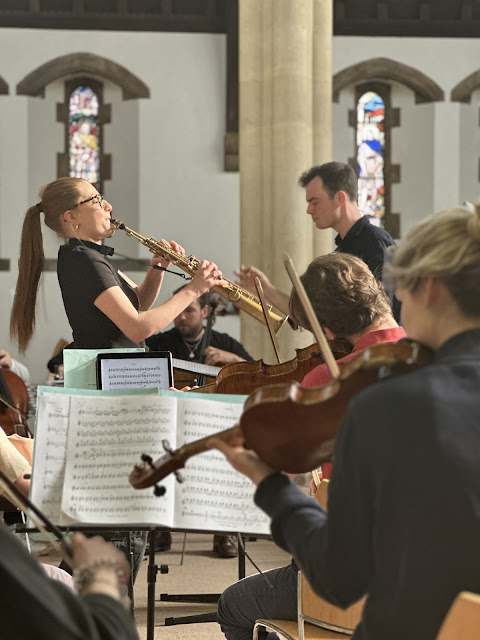 |
| Handel: Deidamia - Nicolò Balducci - Wexford Festival Opera (Photo: Pádraig Grant) |
Handel: Deidamia; Sophie Junker, Nicolò Balducci, Sarah Gilford, Bruno de Sá, Rory Musgrave, Petros Magoulas, George Petrou, Wexford Festival Opera; National Opera House, Wexford
Reviewed 30 October 2025
Handel's final opera in a stylish production that combines playful elements with some powerful singing but which lingers a bit too lovely over details leading to an over-long evening
It is likely that Handel did not write his opera Deidamia in 1741 with a view to it being his final Italian opera. But Handel's tussles with the rival Opera of the Nobility, even though his company had ultimately come out on top, had perhaps not only left him feeling somewhat jaded by Italian opera but left the opera going public in London jaded too. Add to this that Handel had started to discover the possibilities of oratorio and you have a situation where everything could change. Oratorio did not require expensive sets, and its focus on English singers led Handel to work with a group of soloists many of whom he had trained himself. Somehow the complexities and costliness of staging Italian opera got left behind.
And if we focus on those final Italian operas it becomes clear that Handel was experimenting with the form itself. Whilst Ariodante and Alcina from 1735 both seem to hark back to Handel's glory days, his later operas included Arminio (1737) which is so compressed as to be almost telegraphic, Giustino (1737) and Serse (1738) where the plots incorporate rather more of the early Venetian plot than was usual in 18th century London. Serse's semi-comic elements also bring forth a Handel we are not used to. This sense of the sly satirical continues in Imeneo (1740) where the heroine ends up with the 'wrong' man - she chooses the robust baritone whilst the noble (castrato) hero does not get the girl. Something similar is happening in Deidamia (1741) where the hero spends most of the opera pretending to be a women, except in Handel's performance the singer was a woman. Structurally these operas also reveal a Handel who is experimenting with form, no longer reliant solely on the large scale da capo aria.
 |
| Handel: Deidamia - Bruno de Sá, Sophie Junker - Wexford Festival Opera (Photo: Pádraig Grant) |
Deidamia was not a success and Handel did not even raid the opera as a source for later works. Instead it languished until more recent 20th century performances, but even then it remains a real rarity. Wexford Festival Opera included it in their Myths & Legends season in a co-production with the Göttingen Handel Festival whose artistic director, George Petrou conducted and directed. We caught the final performance on Thursday 30 October 2025, with Sophie Junker as Deidamia, Nicolò Balducci as Ulisse (Odysseus), Sarah Gilford as Nerea, Bruno de Sá [last seen as Cleofide in Vinci's Alessandro nell'Indie at Bayreuth, see my review] as Achille (Achilles), Rory Musgrave as Fenice (Phoenix) and Petros Magoulas as Licomede. Designs were by Giorgina Germanou with video by Arnim Friess.





%20TallWall%20Media_Oxford%20Song.jpg)
%20TallWall%20Media_Oxford%20Song.jpg)
%20TallWall%20Media_Oxford%20Song.jpg)
%20TallWall%20Media_Oxford%20Song.jpg)



















.jpg)








